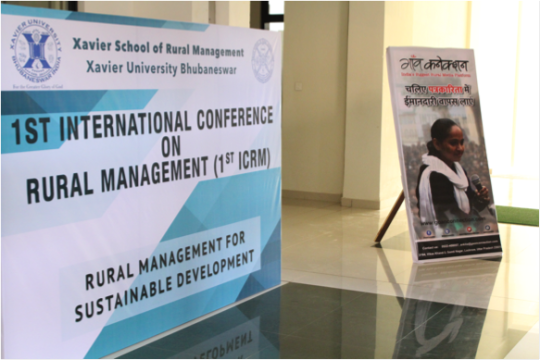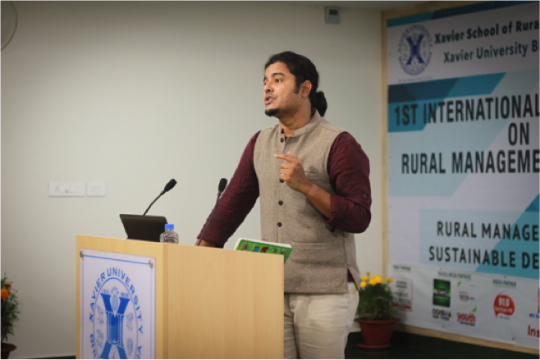TCI-TARINA participates in the International Conference on Rural Management in Bhubaneswar
Improving the quality of life for rural people is key to sustainable development in countries like India, where one-third of the population lives in villages. At the first International Conference on Rural Management (ICRM), professionals gathered to share evidence and best practices on topics essential to advancing rural development in India, such as improved agriculture and better access to health care and education. The conference, organized on November 23-24, 2017 by the Xavier School of Rural Management (XSRM) at Xavier University in Bhubaneswar, focused on the overarching theme “Rural Management for Sustainable Development.”

The ICRM at Xavier University in Bhubaneswar, Odisha, India.
The ICRM was designed to explore how the field of rural management intersects with and underpins efforts toward achieving the United Nation’s 17 Sustainable Development Goals (SDGs) in the areas of food security, health, poverty, inequality, clean energy, peace, justice, and environmental protection. As the organizational landscape for rural development transforms, well-established and traditional practices are increasingly giving way to innovative and emerging practices. To systematically and critically consider this evolution, the conference provided an avenue for luminaries to present their papers and cases on innovative practices in a variety of areas related to rural development management.
About 85 professionals attended the event from various organizations, including the Odisha State Government’s Department of Agriculture and Department of Rural Development, the International Food Policy Research Institute (IFPRI), the Indian Institute for Rural Management, the Tata Sustainability Group, and Gram Vikas. TCI-TARINA was also invited to speak during a panel session on “Social and Economic Perspectives of Development.” As the Program Coordinator and Gender & Nutrition Specialist for TCI-TARINA, I attended the session to deliver a presentation on the problem of malnutrition in Odisha, as well as the need for a multisector approach to achieve the SDG World Health Assembly (WHA) targets for better nutrition.

Dr. Shubh Swain delivering a presentation during a panel session at the ICRM.
Drawing upon evidence from India’s recent National Family Health Survey (NFHS-4), the presentation showed the high prevalence of undernutrition among children and women in Odisha (stunting 34.1%, wasting 20.4%, anemia among women 51%), and how the burden is greater among the rural population than the urban population. I explained the trend and pattern of the indicators targeted by WHA to achieve better nutritional health. I also explained the gap between the current average annual rate of reduction (AARR) and the required AARR, as well as the gap between the current average annual rate of increase (AARI) and the required AARI for select nutrition-related indicators. The discussion pointed toward the need to accelerate the efficacy of programs and possible mechanisms in addressing undernutrition in Odisha.
During the presentation, I emphasized how existing service delivery platforms used by different sectors like agriculture, food, health, gender, and education can be leveraged to address undernutrition more effectively through a nutrition-sensitive approach. Other panelists supported this call for a multisectoral approach to achieve SDG targets related to rural development.
By Dr. Shubh Swain
Dr. Shubh Swain (ss2729@cornell.edu) is the Program Coordinator and Gender & Nutrition Specialist for TCI-TAIRNA.

